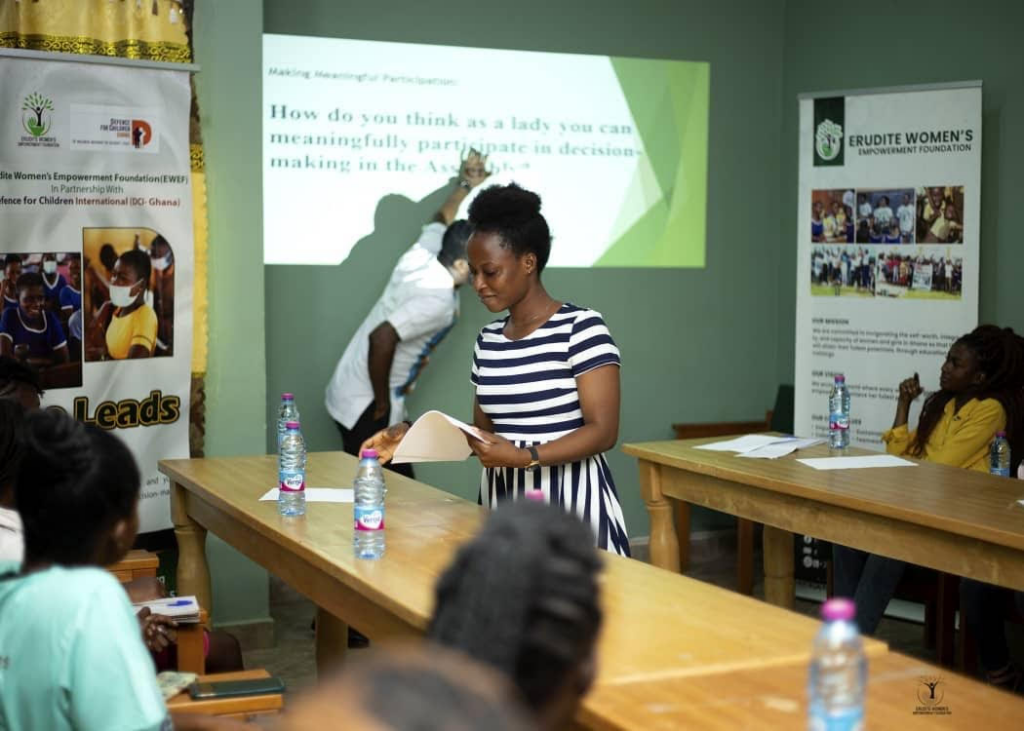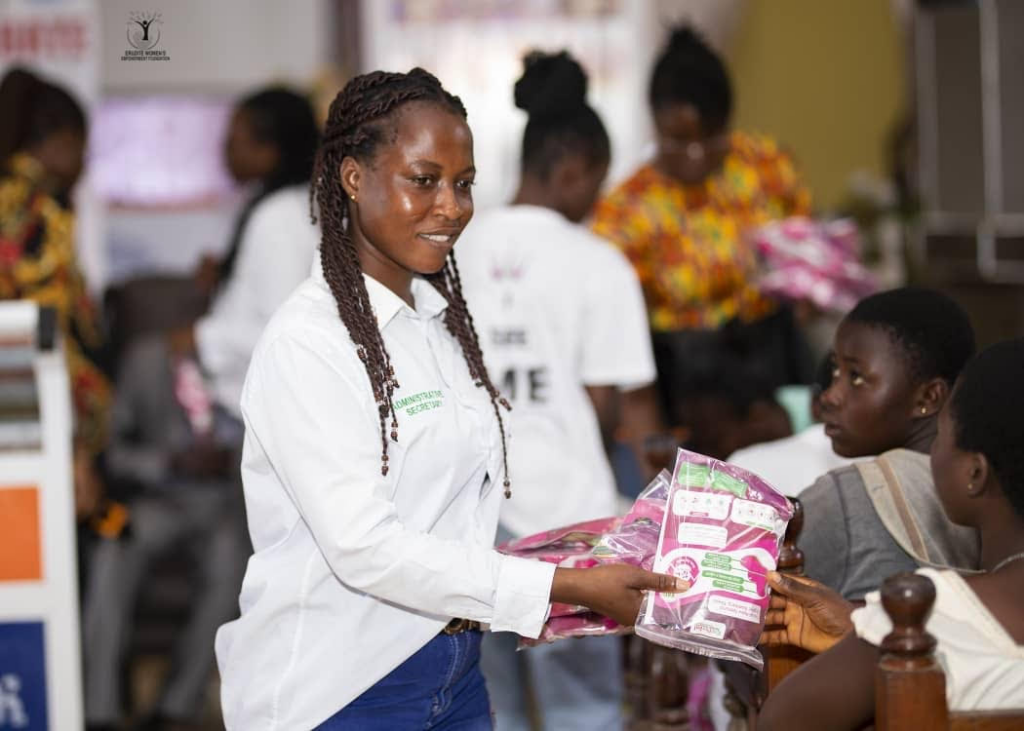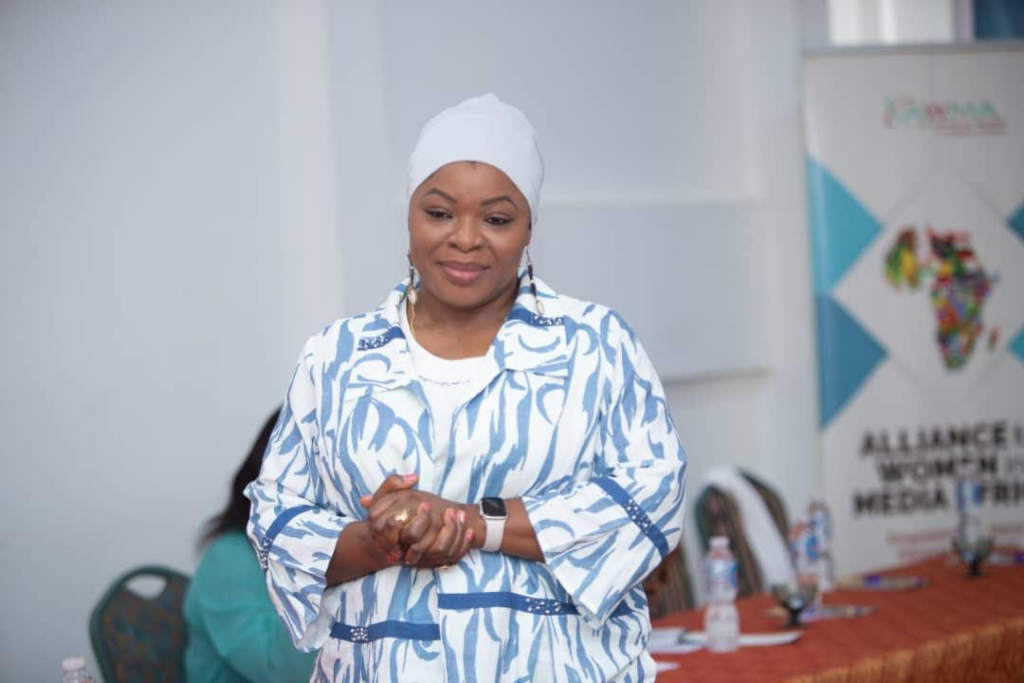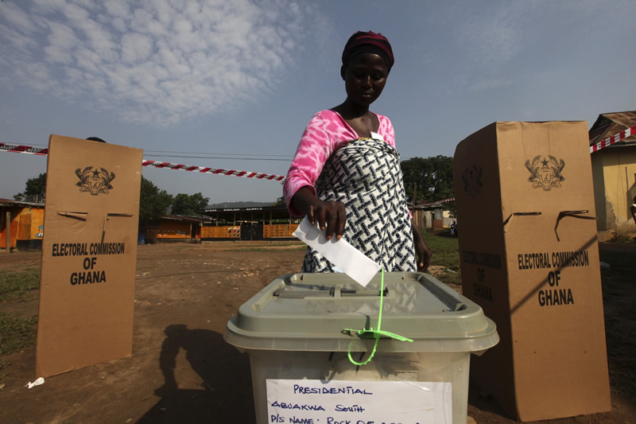Ghana has failed to make significant strides since its first attempt in the 1960s to institute a legislative framework to increase women participation in leadership and decision-making positions.
The number of women in leadership positions at both the local and national levels is nothing to write home about as the country has failed to achieve the 30% UN target for women's participation.
Female aspirants for the local government elections and civil society organizations are pushing for the Affirmative Action Bill to be passed into law.
They lament the gender gap has widened socioeconomic and political development.
“I promise on my honour to be faithful and loyal to Ghana, my motherland,” said Belinda Asigiri Amadu, a Ghanaian patriot with leadership ambitions.
At a young age, she had promised to serve her community to the best of her abilities - to ensure their socioeconomic well-being and growth.
Her motivation stemmed from fewer women participating in decision-making positions in her evolving community at Asante Akyem Central in the Ashanti Region.
“What motivated me was to see more women participating in governance. Growing up I had the interest to serve my people,” she said.

Her conviction of being yet another female to be elected among an imbalanced local leadership at the end of the district-level elections on December 19, 2023 beams through her smile as she shares her motivation.
Belinda is contesting to become a unit committee member in the Odumasi Ahyiayem electoral area in the Asante Akyem Central constituency.
“I decided to partake in this election so that the influence of females will be sustained in the government sector,” she revealed.
Her optimism reflects that of many women hoping to take up leadership portfolios in the country but are somewhat repressed by the gender status quo.

Conducted every four years, the district-level elections have over the years not only served as a platform for service but also a rudimentary means to the upper echelons of the political landscape.
This year’s elections would see over 6,200 members elected to serve in various capacities in all district assemblies nationwide for the next four years.
Local governance in Ghana touches the daily lives of women – their markets, their homes, sanitation, and use of spaces for religious activities, recreation and economic activity, location of public utilities amongst others.
However, women’s participation in local governance is not a reflection of their proportion of representing the highest (50.1%) population in Ghana against the male’s 49.9 percent.
Less Women in Ghana’s Political Leadership
Data from the Alliance for Women in Media reveals females elected as assembly members are less than 5%. It was estimated that they constituted 3.8% of the 6,270 membership; and out of 6,033, there were 246 women (less than 5%).
Female appointed members constitute 591 out of 2,242 (26%). Women represented 15% (38 out of 261) individuals appointed to positions of either Municipal, Metropolitan and District (MMDCEs) Chief Executives in the country.
An almost similar percentage of 13%, representing 34 females out of 261, is seen for assemblies' Coordinating Directors while Regional Coordinating Directors stands at 2 out of 16 (12.5%).
On the floor of Ghana’s parliament, female legislators only form 14.5% (40) out of a total of 275 lawmakers representing the various constituencies in the country.
Although the numbers have increased overtime since the country’s first attempt to involve women in leadership roles in the 1960s, the figures appear insignificant to achieve gender parity.
In the last 28 years of Ghana’s elections, little progress has been made for women representation at the local assembly level. In 1994, women constituted 2.9% of elected assembly members. The proportions increased slightly in 1998 and in 2002 but remained under 7%.
The figures peaked in 2006 when women constituted 8% of the elected assembly members and started dropping in 2010 to 7%, and further in 2015 to under 5% (4.5%) and dipped in 2019.
In 2019, 18,510 people contested for over 6,000 local assembly portfolios across the country with 17,601 of the aspirants being males; 909 females put themselves up, women constituted about 4.9% of the candidates.
At the unit committee level, there were 38,520 aspirants: 34,769 male candidates and 3,751 female candidates (9.7%).
6 Decades of Failure? Affirmative Action Bill still not passed
In the early days after Ghana gained its independence, the country legislated an Affirmative Action Act in the middle of 1960 allowing 10 women members to represent the regions of the country in the then legislature.
The law recognised that women’s political participation is a critical component of democratic dialogue and social cohesion.
However, it was lost under the weight of the political upheavals which took place in the intervening years of the country.
The nation has since made various commitments by signing to global declarations and protocols that advocated for increased women’s participation and representation in public life.
Ghana’s Parliament in 2011 re-initiated processes to have the Affirmative Action bill passed into law, but the efforts have suffered setbacks and to date the bill has failed to pass the basic parliamentary proceedings.
After nearly 60 years following the Affirmative Action move of the 1960s, Ghana has failed to meet the minimum UN recommended threshold of 30 per cent women representation in either the local or the national level decision-making process.
The Bill seeks to encourage efforts towards addressing socio-cultural, political, economic, and educational gender imbalances in private and public sectors in accordance with Clause 4 of Article 17 of the 1992 Constitution.
This is in spite of various calls made by civil society groups, gender advocates and importantly female parliamentarians.
Bill won’t be passed under Certificate of Urgency - Speaker of Parliament
“A critical Bill like the Affirmative Action (Gender Equality) Bill has come to Parliament under the certificate of urgency, please it won’t happen. We won’t pass it under a certificate of urgency,” Speaker Alban Bagbin re-echoed to his audience.
He was speaking at a Breakfast Forum in Accra, on the theme “Thirty Years of Parliamentary Democracy under the Fourth Republic: Reflections on Citizens’ Engagement and the Way Forward”.
His resolution not to rush the passage of the bill was hinged on not allowing recent pressures from the International Monetary Fund thrust forward a bill which is still not well-crafted.
According to the Speaker, the bill in its current form needs broader consultations for a well-defined and crafted law.
“There are critical stakeholders we must consult and make sure we go together, we will not be dictated to by the IMF. The IMF should know that the Inter-Parliamentary Union (IPU) has fixed 2040 for all Parliaments in the world to reach gender parity,” he emphasized.
His comments infuriated a number of advocates and civil society groups, including the African Women Leaders Network and the Alliance for Women in Media.
They believe the time is now to get the Bill passed to ensure gender parity.

While acknowledging the bill was fraught with some clausal challenges, Convenor of the Affirmative Action Bill Coalition, Sheila Minkah-Premo, says portions of the bill had to be smoothened.
“Particularly the part to do with political parties and elections. Section 24 is very weak. It’s not imperative. It’s been said that political parties are voluntary organizations, so they should willingly ensure gender inclusion in their manifestos,” she noted at a meeting with the Ghana chapter of the African Women Leaders Network.
The coalition is however expected to hold a consultative dialogue with the Speaker as Convenor of the group assures passage of the bill by 2024.
A not-so-resounding voice for gender parity
As the election date inches closer, many civil society organizations are pushing for gender equality to ensure national cohesion and community ownership.

Convener of the Alliance for Women in Africa, Shamima Muslim, observes only women organizations are leading the charge for the bill to be passed.
Little effort is seen from women in parliament.
“We as women ourselves, our voices have not been loud, even though we have been mobilizing for years. In fact, it is women coalitions who are leading the advocacy for the passage of the bill. Collaboratively, other women groups in parliament, no! We do not see a united and a loud voice within parliament of over 40 women who are there, being strong voices for the passage of the affirmative action bill,” she said.
Some reports allegedly suggest that some women in parliament do not support the passage of the bill.
They argue that women should not be given freebies but rather should be made to contest and fight for positions.
Optimism
Until its passage, a number of women like Belinda Asigiri remain unfazed by the present circumstances to thwart their efforts to stand out in a male-dominated space.
She is positive about herself and other female contestants taking up a majority of seats at the district-level elections.
She says the electorate in her community are anxious to see a change.
“We are 8 in number. There are 3 ladies and 5 men. The chances of the females winning are high. During our campaign tours, the responses we get are encouraging. I am passionate about women empowerment. People see me as a role model. I have a number of young ladies I am also mentoring,” she said.
The Alliance for Women in Media says the media has a role to play in uniting Ghana around a broad-based agenda with common goals, values and aspirations in local governance leadership.
Women’s visibility and participation must be promoted beyond cleavages and factions around ethnicity, religion, partisan allegiances, gender and social status.
Latest Stories
-
Asiedu Nketia says EC with Jean Mensa at helm ‘Must be reset’
3 hours -
‘The entire EC leadership must go; they are not fit for purpose’ – Asiedu Nketia
4 hours -
Banks record GH¢4.3bn profit in April 2025
4 hours -
Banks shareholders’ funds grew by 42.6% to GH¢43.9bn in April 2025
4 hours -
Banks NPL declined to 23.6%, but total NPL stood at GH¢21.7bn in April 2025 – BoG
4 hours -
‘This EC is not fit for purpose’ – Asiedu Nketia demands EC overhaul
4 hours -
Government must build a second CBM to enable vessels discharge quickly, eliminate Leycan bureaucracy – COMAC Chairman
5 hours -
At least eight killed and hundreds hurt as Kenya protesters battle police
5 hours -
Ghana lacks capacity for 6-month strategic fuel reserves – COMAC Chairman
5 hours -
Small-scale miners urge fairness in commendable anti-galamsey fight
6 hours -
Murray wants to shield kids from ‘damaging’ social media
6 hours -
KNUST hosts workshop to tackle gender-based violence and sexual harassment on campus
6 hours -
Gov’t reinstates September 21 as Founders’ Day, declares July 1 as public holiday
6 hours -
Gov’t to recruit 50k teachers, 10k non-teaching staff in 2025 – Minister
7 hours -
KATH inaugurates Africa’s first National Cleft Centre to combat cleft stigmatization
7 hours

